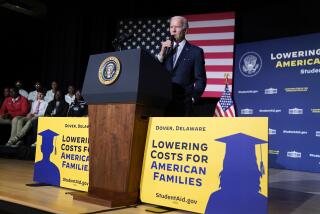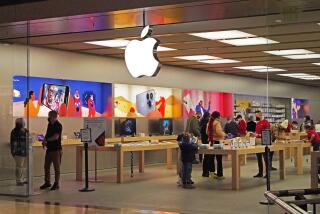Appeals Judge Lifts Ban on Motorola Chip Sales
- Share via
Motorola Inc., embroiled in a bitter patent dispute with Hitachi Ltd. of Japan, late Tuesday won the right to continue selling one of its most popular computer chips.
The federal appellate judge’s decision temporarily stayed a lower court ruling earlier in the day. The lower court would have forced Motorola to pull its 68030 microprocessor--the brains of several popular personal computers--off the market until the patent battle is resolved.
Under terms of the stay, issued by U.S. Appeals Court Judge Howard T. Markey in Washington, Motorola has until Friday to file a formal appeal of the lower court ruling.
However, the latest development sets the stage for a negotiated settlement between the semiconductor makers, an event analysts expect quickly. The companies’ representatives met all day Tuesday near Motorola’s headquarters outside Chicago to try to end the 18-month-long dispute.
Analysts said Motorola should be motivated to settle the case rapidly because of the potentially disastrous effect a prolonged sales ban on the 68030 would pose for the company and its customers, notably Apple Computer, which uses the chip in all but three of its Macintosh personal computers. Analysts say the 68030 microprocessor generates well over $100 million in annual sales for Motorola.
U.S. District Judge Lucius D. Bunton, who issued the sales ban, has admitted that the ruling was designed to force a negotiated settlement to a dispute he once said should never have been taken to court. The ruling also prohibited Hitachi from selling one of its chips in the United States.
However, both sides have apparently taken a hard-line approach in settlement talks. Motorola, which stands to lose more from a U.S. sales ban than Hitachi, filed new court papers last week in another effort to prove that its microprocessor does not infringe on a patent Hitachi won in 1973. The latest papers contend that Motorola made its own drawings of the technology in question as early as 1966.
Meanwhile, major Motorola customers said they did not expect a temporary sales ban to affect them. Apple Computer said it had been “prudent” about its inventory levels of the 68030 over the last several months. Hewlett-Packard said agreements it has with Hitachi would allow the U.S. company to receive shipments of the disputed chips, regardless of court rulings.
Bunton originally ruled in March that the Motorola chip infringes on a Hitachi patent, but he temporarily delayed putting any order that banned sales into effect. On Monday, Bunton informed both companies that the order would take effect Tuesday, prompting Motorola to immediately appeal.






